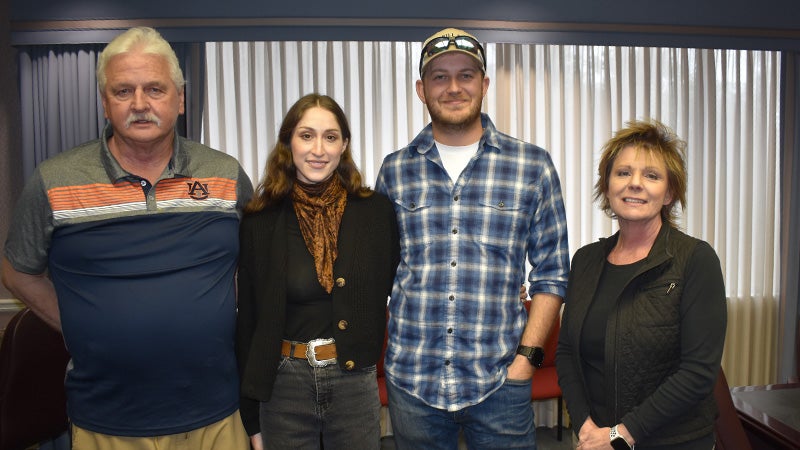Lily Hill Farms owners talk direct consumer sales vis internet
Published 9:00 am Saturday, January 14, 2023
|
Getting your Trinity Audio player ready...
|
WEST POINT — At Thursday’s meeting of the West Point Rotary Club, Lily Hill Farm owners Marc and Avery Claire Wrigglesworth talked about a new way to sell the beef they are producing in Troup County. They are doing it directly to the consumer via the internet.
Marc handles the day-to-day operations of the farm and Claire is the marketing specialist.
When a shopper buys a meat product from hamburger meat to steak in the grocery store, they have no idea of where it came from. They can readily see that it has been inspected and approved by the U.S. Department of Agriculture. It has the USDA label on the package, but that alone doesn’t tell where the meat came from or how the cattle were raised. For all they know, it could have come from Argentina, Australia or Alabama.
It’s different when the shopper deals with Lily Hill Farm. First of all they don’t go to a store. They can make the purchase in the convenience of their home via their home computer or smartphone. They can contact them at www.lilyhillcattle.com or contact@lilyhillcattle.com. They are on Instagram and on Facebook: @lilyhillcattle.
Marc is originally from the English Channel island of Jersey. He and Claire were living there three years ago when an opportunity arose for Claire to return home to Troup County, Georgia and manage the farm that had been in her family for three generations. Her dad was retiring from the business and was looking to sell the farm.
The young couple was making a good living in international finance, but both were intrigued by the possibility of living in the U.S. and running a family cattle farm.
“I love the outdoor life,” Marc told members of the club. “I thought it would be better than having a 9 to 5 job in an office.”
In addition to being well known as the sunniest spot in the United Kingdom, Jersey is also famous for a breed of cattle that originated there.
“We got here before Covid hit,” Marc explained, “and 2020 was a terrible year for us. It wasn’t much better in 2021. We then decided not to settle on the commodity market and to do our cattle and calf operation in a different way.”
In August 2022, that new way of selling beef directly to the consumer via the internet went live.
“We made $5,000 the first day, and $42,000 for the rest of the year.” Marc said. “We are now selling in 42 states and several foreign countries.”
“We want people to know our story and the story behind our beef,” Claire said. “We want them to know how it’s made.”
The cattle being raised at Lily Hill Farm are grass fed and grain finished. They are raised in the all-natural way with no additional growth hormones, antibiotics or animal byproducts. “Our confinement-free operation allows our cattle to grow as nature intended,” Claire added. “There’s also the added benefit of humane practices that keep our stock healthy and happy every step of the way.”
Along with the fresh green grass that grows on the farm, the Lily Hill Farm cattle are fed a high quality, custom blend of soybean hulls, cotton seed and steamed corn. “This mixture has been tailored to our cattle and is designed to complement their daily intake of natural forage,” Claire said.
Black Angus cattle are raised on the farm. Most mature cows weigh in around 850 to 900 pounds, and some can get up to the 1,500-pound range. When the time is right, cattle are taken to USDA-approved plants in Dothan, Ranburne and in Roanoke, Alabama, where Gaines Lanier has a plant.
The meat is returned to the farm, where it is aged a minimum of 14 days in a walk-in freezer.
“Our dry aging process improves the eating quality and flavor of the beef,” Marc said. “Many people have told us that beef that’s raised in the Southeast is better tasting than the beef that comes from Western states. I think it’s because of the Georgia grass and grain we feed our cattle.”
The fact that it’s Black Angus beef is a major plus. The beef is noted for its marbled texture, tenderness, juiciness and preferred flavor over other breeds.
Everything sold by Lily Hill Farm has been approved by the USDA. “Their inspectors verify that our beef is safe to consume and that animal care standards have been met,” Marc said.
For now, the farm is shipping out its beef directly to the consumer, but Marc and Claire are looking at having a retail store where people can come to shop. “We’d like to offer local pricing, but we are not quite set up for that yet,” Claire said.
What’s unique about purchasing the USDA-approved beef from Lily Hill Farm is that the consumer knows exactly where it came from and how the cattle were raised.
“We can’t guarantee that all of our cattle are prime beef, but most of them are,” Marc said. “There’s a lot of smoke and mirrors in the beef industry. Some of the major processors import their beef from outside the U.S. You don’t know if what you are buying has been farm raised or if it’s even from this country.”
Marc and Claire are firm practitioners of sustainability. “We believe in producing a sustainable and ethical product,” Claire said. “That’s why we choose to implement sustainable and regenerative practices. Our cattle are moved daily to fresh pastures using a system known as rotational grazing. This practice not only helps improve pasture quality but it also aids in the regeneration of the soil’s health and microbiome.”
Claire grew up on the farm when it was being run by her dad, Ned Mallory. The farm gets it name from the many wild lilies that grow on a prominent hill on the site. The farm is located in the Gray Hill community off Baugh’s Cross Road.
The online business had a really good day on the Tuesday before Christmas. “We sold a ton of beef that one day,” Marc said.





